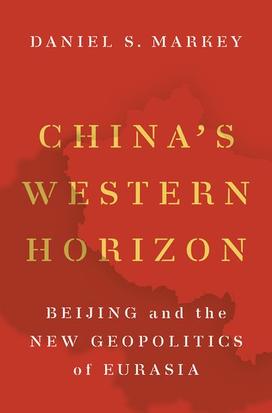Daniel S. Markey *00 Analyzes Chinese Foreign Policy and Its Growing Sphere of Influence

The book: To understand the foreign policy of Chinese President Xi Jinping, look no further than his neighbors to the west — countries like Pakistan, India, Kazakhstan, and Russia. In his latest book, Daniel S. Markey *00 analyzes recent shifts in China’s relationships with these nations and explains their implications for American foreign policy.
China’s Western Horizon (Oxford University Press) is an examination of regional geopolitics drawn from interviews, public records, and historical research. Markey’s lucid recommendations for future U.S. strategy in China should appeal not only to academics and policymakers, but also to lay people hoping to understand one of the world’s most powerful economies.
The author: Daniel S. Markey *00 served on the Policy Planning Staff at the U.S. Department of State from 2003-2007, where he handled the portfolio for South Asia. He spent eight years as a senior fellow at the Council on Foreign Relations before accepting a professorship at Johns Hopkins University in 2015. After he received his Ph.D. in 2000, Markey briefly taught in the Princeton politics department.
Opening lines: In January 2000, Pakistan’s president and army chief, Pervez Musharraf, traveled to Beijing. Just a few months earlier, he had toppled Pakistan’s civilian government in a coup, earning Washington’s ire and a stiff round of U.S. economic sanctions. During closed-door sessions with Chinese president Jiang Zemin and premier Zhu Rongji, Musharraf pointedly requested China’s assistance. He had something very specific in mind: He wanted Beijing’s help to construct Gwadar, a new Pakistani deep-water port on the Arabian Sea.
Musharraf needed the trip to China to show that he had Beijing’s full confidence and to cement his domestic political legitimacy after the coup. He projected this aim in his comments to the media: “China has stood by Pakistan in difficult times. Our relations have remained strong and steadfast, notwithstanding the cataclysmic changes in the political and security environment at the international, regional or domestic level.”
But Musharraf also had a broader geopolitical agenda, one he proudly shared at a small dinner reception in April 2017. “Yes, Gwadar was entirely my idea, not a Chinese idea. I was concerned only about Pakistan’s strategic interests,” he explained. A Chinese-built port at Gwadar would demonstrate Pakistan’s close ties with Beijing and send an obvious signal to India that Pakistan was not to be trifled with. In particular, Musharraf said that he had been concerned India could blockade Pakistan’s main port of Karachi. With a functioning port at Gwadar near the gateway to the Persian Gulf, Pakistan could also threaten India’s access to Middle Eastern oil. At the very least, a Pakistani base at Gwadar would force India to think twice before launching its own naval operations against Pakistan.
For Musharraf, sending a tough message to India was essential. Just six months earlier, India and Pakistan had come to blows in the Kargil War, a border conflict that Musharraf—then the army chief but not yet president—had advocated and led. A year before that, the two sides had traded nuclear tests. So when Musharraf visited China in 2000, the Indo-Pakistani border was still extremely tense, one of the most likely places in the world to see a nuclear war.
Reviews: "Markey's important and insightful new book makes a valuable contribution to the literature on China's expanding global presence. Casting his eye across a vast swath of continental Eurasia, Markey analyzes both the forces driving Chinese policy and the factors shaping the responses of the poorer and weaker nations in its path. Markey's research is broad as well as deep, his assessments are balanced and measured, and his conclusions will inform the thinking of scholars and policymakers alike." -- Aaron L. Friedberg, Professor of Politics and International Affairs, Princeton University










No responses yet